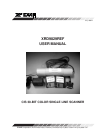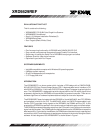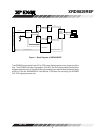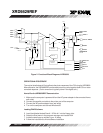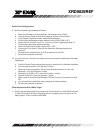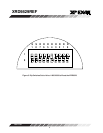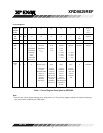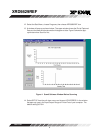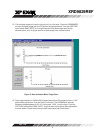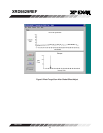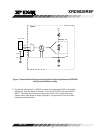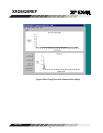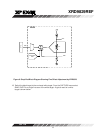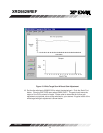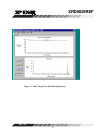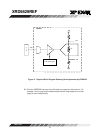
XRD9829REF
2
Rev. 1.00
EVALUATION KIT PART LIST
This kit contains the following:
• XRD9829REF CIS 30-Bit Color Single Line Scanner
• XRD9829REF User Manual
• ScanIt 1.0 Software Installation Diskettes (2)
• XRD9829 Data Sheet
• Scan Targets (Black, White, Color)
FEATURES
• One line scanning functionality of XRD9829 with CANON 300 DPI CIS
• Easy use with most personal computers through Parallel Port Interface
• Simple way of loading the Serial Port of XRD9829 to adjust gain and offset
• Software ScanIt to view single line scan
• Optimized Layout with Four Layers
SYSTEM REQUIREMENTS
• Intel 486 compatible computer with Windows 95 operating system
• 8 MBytes system memory
• 25-pin D-shape parallel port receptacles
• 3 1/2” floppy disk drive
INTRODUCTION
The XRD9829REF is a demo system which includes a PCB design with a CANON CWB-
30216G 300 DPI Color Contact Image Sensor (CIS). It demonstrates how to interface a CIS
with EXAR’s XRD9829, a 10-bit Linear CIS/CCD Sensor Signal Processor to get a single line
scan. The XRD9829REF is designed to provide a signal path for the CIS output signals to be
processed, digitized by the XRD9829 and transmitted to a personal computer. There are no
software algorithms or hardware implementations to adjust for true color response.
The XRD9829REF board is loaded with the XRD9829, a Vantis MACH435, two FIFO SRAMs
and peripheral circuits for the CIS. The MACH435, which is a CMOS Programmable Logic
Device (CPLD) provides timing signals to the XRD9829, the SRAMs and the CIS. It also
programs the XRD9829 to operate in the correct mode and adjust for gain and offset values.
The XRD9829 processes the analog output from the CIS sensor, level-shifts and converts the
signal into digital codes. The SRAMs gate the digitized data from the XRD9829 and stores the
data temporarily. Controlled by the software, the SRAMs send the data through a parallel port
connection to the PC and histograms of raw data are displayed in the monitor using the ScanIt
software. A block diagram of the XRD9829REF is shown below in Figure 1.



